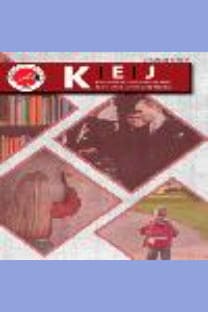An investigation on Turkish EFL Majoring Students’ Unethical Behaviors
İngilizceyi Yabancı Dil Olarak Öğrenen Türk Öğrencilerin Etik Olmayan Davranışlarının İncelenmesi
___
Alzahrani, S. M., Salim, N., & Abraham, A. (2012). Understanding plagiarism linguistic patterns, textual features, and detection methods. IEEE Transactions on Systems, Man, and Cybernetics, Part C (Applications and Reviews), 42(2), 133-149.Angelil-Carter, S. (2000). Stolen language? Plagiarism in writing. Essex: Pearson Education Limited.
Beasley, J. D. (2004). The impact of technology on plagiarism prevention and detection: Research process automation, a new approach for prevention. In Plagiarism: Prevention, Practice and Policies 2004: Joint Information Systems Committee Plagiarism Advisory Service Conference (pp. 28-30).
Becker, D. A. & Ulstad, I. (2007). Gender differences in student ethics: Are females really more ethical? Plagiary: Cross‐Disciplinary Studies in Plagiarism, Fabrication, and Falsification, 77-91.
Bolin, A. U. (2004). Self-control, perceived opportunity, and attitudes as predictors of academic dishonesty. The Journal of Psychology, 138(2), 101-114.
Bowers, W. J. (1964). Student dishonesty and its control in college. New York: Bureau of Applied Social Research.
Bretag, T., & Mahmud, S. (2009). A model for determining student plagiarism: Electronic detection and academic judgement. Journal of University Teaching & Learning Practice, 6(1), 47-60.
Carroll, J., & Appleton, J. (2001). A good practice guide. JISC report.
Coughlin, P. E. (2015). Plagiarism in five universities in Mozambique: Magnitude, detection techniques, and control measures. International Journal for Educational Integrity, 11(1), 1-19.
Eriksson, L., & McGee, T. R. (2015). Academic dishonesty amongst Australian criminal justice and policing university students: Individual and contextual factors. International Journal for Educational Integrity, 11(1), 1-15.
Fezatte, A. (2009). The NEO personality inventory, attitudes, and academic dishonesty. Retrieved from https://open.library.ubc.ca/cIRcle/ collections/undergraduateresearch/52966/items/1.0086030 on 17.11.2017
Hodges, A., Bickham, T., Schmidt, E., & Seawright, L. (2017). Challenging the profiles of a plagiarist: a study of abstracts submitted to an international interdisciplinary conference. International Journal for Educational Integrity, 13(1), 1-15.
Hollinger, R. C., & Lanza-Kaduce, L. (1996). Academic dishonesty and the perceived effectiveness of countermeasures: An empirical survey of cheating at a major public university. NASPA journal, 33(4), 292-306.
Jolly, P. (1998). The ethics of plagiarism. (ERIC Document Reproduct Service No. ED421725).
Jordan, A. E. (2001). College student cheating: The role of motivation, perceived norms, attitudes, and knowledge of institutional policy. Ethics & Behavior, 11(3), 233-247.
Lambert, E. G., & Hogan, N. L. (2004). Academic dishonesty among criminal justice majors: A research note. American Journal of Criminal Justice, 29(1), 1-20.
Leming, JS (1980) Cheating behavior, subject variables, and components of the internal-external scale under high and Low-risk conditions. Journal of Education Research, 74(2):83–87.
Macaulay, A. D. & Lemm, K. M. (2014). Socioeconomic status and academically dishonest behavior. Presented in aposter session at the Western Psychological Association conference, Portland, OR.
McCabe, D. L. & Trevino, L. K., (1993). Academic dishonesty: Honor codes and other contextual influences. Journal of Higher Education, 64(5), 521-538.
McCabe, D. L., Treviño, L. K., & Butterfield, K. D. (2001). Cheating in academci institutions: A decade of research. Ethics &Behavior, 11(3), 219-232.
Murdock, T. B., Hale, N. M., & Weber, M. J. (2001). Predictors of cheating among early adolescents: Academic and social motivations. Contemporary Educational Psychology, 26(1):96-115.
Nonis, S. & Swift, C.O. (2001). An Examination of the relationship between academic dishonesty and workplace dishonesty: A multicampus investigation. Journal of Education for Business, 77(2), 69-77
O’Neill, H. M. (2012). The impact of honour codes and perceptions of cheating on academic cheating behaviours, especially for MBA bound undergraduates. Accounting Education: An International Journal, 21(3), 231-245.
Oxford English Dictionary (2009). Accessed from http://www.askoxford.com/concise_oed/plagiarize?view=uk on 17.11.2017
Park, C. (2003). In other (people’s) words: Plagiarism by university students--literature and lessons. Assessment & Evaluation in Higher Education, 28(5), 471-488.
Pavela, G. (1978). Judicial review of academic decision making after Horowitz. NOLPE School Law Journal, 8(1), 55-75.
Pennycook, A. (1996). Borrowing others’ words: Text, ownership, memory, and plagiarism. TESOL Quarterly, 30(2), 201-230.
Sayed, N., & Lento, C. (2015). The impact of technology on academic dishonesty: Perspectives from accounting faculty. The Accounting Educators’ Journal, (Special Edition), 65-87.
Singh, V., Kumra, S., & Vinnicombe, S. (2002). Gender and impression management: Playing the promotion game. Journal of Business Ethics, 37(1), 77-89.
Stern, E. B., & Havlicek, L. (1986). Academic misconduct: Results of faculty and undergraduate student surveys. Journal of Allied Health, 15(2), 129-142.
Thomas, M. W. (2000). Eschewing credit: Heywood, Shakespeare, and plagiarism before copyright. New Literary History, 31(2), 277-293.
Whitley, B. E. (1998). Factors associated with cheating among college students: A review. Research in Higher Education, 39(3), 235-274.
Wilhoit, S. (1994). Helping students avoid plagiarism. College Teaching, 42(4), 161-164.
Witmer, H., & Johansson, J. (2015). Disciplinary action for academic dishonesty: does the student’s gender matter? International Journal for Educational Integrity, 11(1), 1-10.
Weber, E. U., Blais, A.-R., Betz, E. (2002). A Domain specific risk-attitude scale: Measuring risk perceptions and risk behaviors. Journal of Behavioral Decision Making, 15, 263–290.
- ISSN: 1300-8811
- Yayın Aralığı: 4
- Başlangıç: 1992
- Yayıncı: -
Yabancı Dil Sınıfında Telaffuz Kaygısı Ölçeğinin Türk Dili ve Kültürüne Adaptasyonu
Ebeveynlerin Çocukları ile İlişkilerinin Bazı Değişkenler Açısından İncelenmesi
Etkin Dinleme Eğitiminin Dinlediğini ve Okuduğunu Anlama Üzerine Etkisi
BERKER BULUT, NURİ KARASAKALOĞLU
Çocuk Haftası Dergisi ve Çocuk Eğitimi Açısından İncelenmesi
Danışman Öğretmenlerin Danışman Eğitimi ve Aday Öğretmen Yetiştirme Sürecine İlişkin Görüşleri
SEVDA KOÇ AKRAN, Zehra İŞ ÜNER
CANAN LAÇİN ŞİMŞEK, AYSUN ÖZTUNA KAPLAN, Alper ÇORAPÇIGİL, MUHAMMET EMİN MISIR
